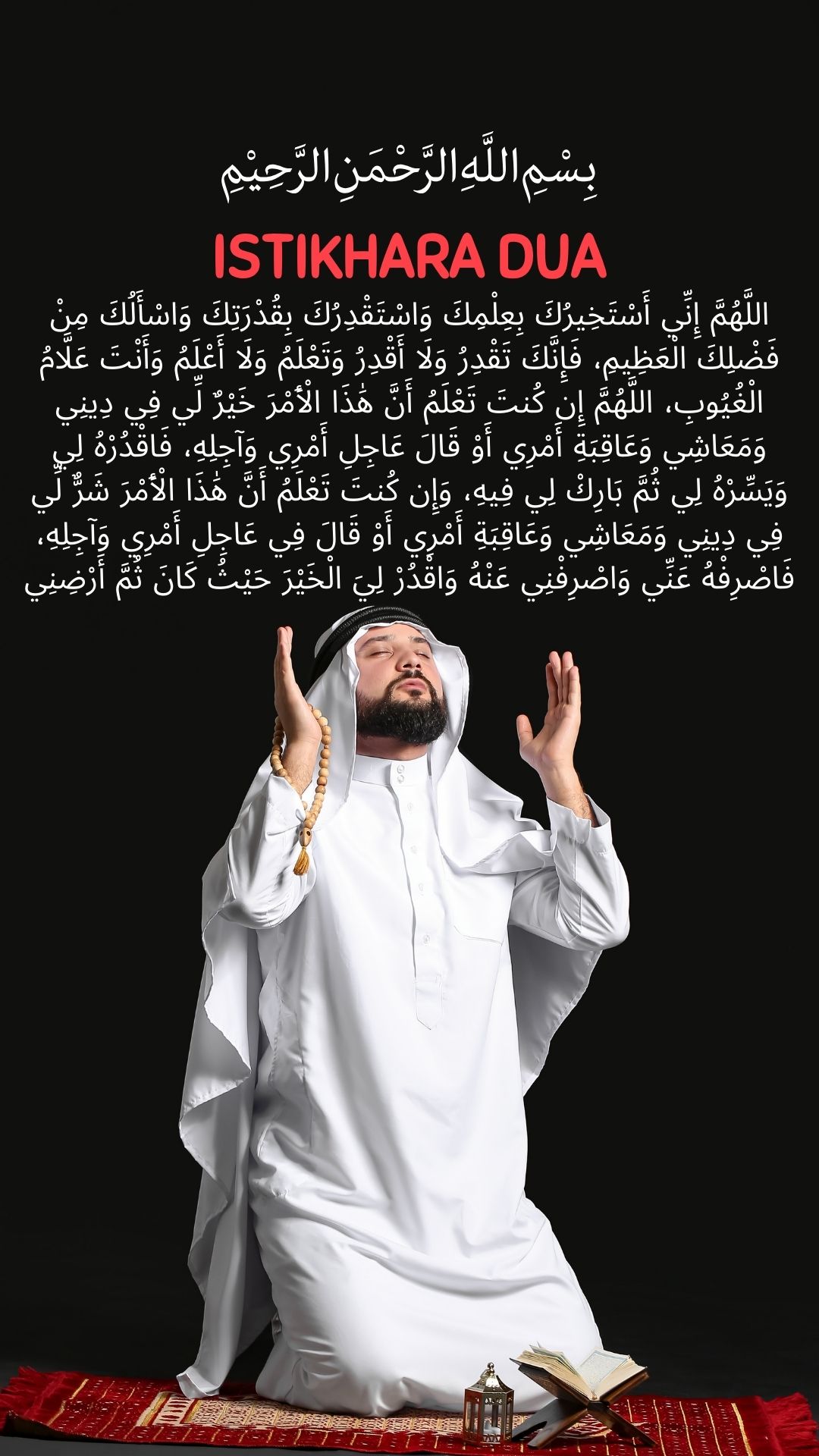Introduction
Making important decisions can be overwhelming and filled with uncertainty. Istikhara Dua is a powerful Islamic practice that allows individuals to seek divine guidance from Allah before making significant life choices. This article explores the meaning, importance, and method of performing Istikhara prayer, ensuring that believers can approach their decisions with clarity and confidence.
What is Istikhara?
Istikhara is an Islamic prayer performed when seeking guidance from Allah in decision-making. The term “Istikhara” originates from the Arabic word “khayr,” which means goodness or betterment, reflecting the essence of seeking what is best for oneself. It is a way of connecting spiritually, seeking divine intervention, and entrusting decisions to Allah’s wisdom.
The Istikhara Dua
One of the essential components of Istikhara is the supplication (dua) recited after performing the prayer. Below is the Arabic text, transliteration, and English translation:
اللَّهُمَّ إِنِّي أَسْتَخِيرُكَ بِعِلْمِكَ وَاسْتَقْدِرُكَ بِقُدْرَتِكَ وَاسْأَلُكَ مِنْ فَضْلِكَ الْعَظِيمِ، فَإِنَّكَ تَقْدِرُ وَلَا أَقْدِرُ وَتَعْلَمُ وَلَا أَعْلَمُ وَأَنْتَ عَلَّامُ الْغُيُوبِ، اللَّهُمَّ إِن كُنتَ تَعْلَمُ أَنَّ هَٰذَا الْأَمْرَ خَيْرٌ لِّي فِي دِينِي وَمَعَاشِي وَعَاقِبَةِ أَمْرِي أَوْ قَالَ عَاجِلِ أَمْرِي وَآجِلِهِ، فَاقْدُرْهُ لِي وَيَسِّرْهُ لِي ثُمَّ بَارِكْ لِي فِيهِ، وَإِن كُنتَ تَعْلَمُ أَنَّ هَٰذَا الْأَمْرَ شَرٌّ لِّي فِي دِينِي وَمَعَاشِي وَعَاقِبَةِ أَمْرِي أَوْ قَالَ فِي عَاجِلِ أَمْرِي وَآجِلِهِ، فَاصْرِفْهُ عَنِّي وَاصْرِفْنِي عَنْهُ وَاقْدُرْ لِيَ الْخَيْرَ حَيْثُ كَانَ ثُمَّ أَرْضِنِي
Transliteration: “Allahumma inni astakhiruka b’ilmika wa astaqdiruka b’qudratika wa as’aluka min fadlika al-‘azim. Fa innaka taqdiru wa la aqdiru wa ta’lamu wa la a’lamu wa anta ‘allamu al-ghuyub. Allahumma in kunta ta’lamu anna hatha al-amra khayrun li fi dinii wa ma’ashii wa aqibati amri, or (fi ‘ajili amri wa ajilihi) faqdirhu li wa yassirhu li thumma barik li fihi. Wa in kunta ta’lamu anna hatha al-amra sharrun li fi dinii wa ma’ashii wa aqibati amri, or (fi ‘ajili amri wa ajilihi) fasrifhu anni wa fasrifni anhu waqdir li al-khayra haythu kana thumma ardini.”
English Translation: “O Allah, I seek Your guidance by virtue of Your knowledge, and I seek ability by virtue of Your power, and I ask You of Your great bounty. You have power; I have none. And You know; I do not know. You are the Knower of the unseen. O Allah, if You know that this matter (mention your need) is good for me in my religion, my livelihood, and the end of my affair, or he said in my life and death and in my affairs, in the present and in the future, then ordain it for me, make it easy for me, and bless it for me. And if You know that this matter is bad for me in my religion, my livelihood, and the end of my affair, or he said in my life and death and in my affairs, in the present and in the future, then turn it away from me and turn me away from it and ordain for me the good wherever it may be, and make me pleased with it.”
This dua asks Allah to grant ease if the matter is good and to turn it away if it is harmful.
How to Perform Istikhara Prayer
Performing Istikhara involves a simple yet profound process:
Preparation
- Perform ablution (wudu) to purify yourself.
- Find a clean and quiet place to pray.
Steps to Perform Istikhara
- Pray Two Rak’ahs: Perform two non-obligatory rak’ahs (units of prayer).
- Recite Surah Al-Fatihah: In each rak’ah, recite Surah Al-Fatihah followed by any other Surah.
- Recite the Istikhara Dua: After completing the two rak’ahs, recite the Istikhara dua with sincerity.
- Reflect and Trust Allah: After performing Istikhara, wait for a sense of clarity and ease regarding your decision.
When to Perform Istikhara?
Istikhara can be performed at any time except during prohibited prayer times (sunrise, sunset, and when the sun is at its zenith). It is highly recommended to perform Istikhara after the Isha (night) prayer.
Using Istikhara for Marriage
Istikhara is commonly performed when considering marriage. Steps to follow:
- Perform Istikhara with a sincere heart, seeking Allah’s guidance.
- Be patient and trust the process.
- Observe any feelings of ease or discomfort after praying.
Common Misconceptions About Istikhara
- Istikhara guarantees dreams as answers: While some may receive dreams, Istikhara does not always manifest through visions.
- Immediate results: The response to Istikhara may take time and requires patience.
- Someone else can perform Istikhara on your behalf: Istikhara is a personal act of worship and should be performed by the individual making the decision.
Benefits of Istikhara (Prayer for Guidance) in Islam
Istikhara is a special prayer that a Muslim performs to seek Allah’s guidance in making an important decision. It holds immense spiritual and practical benefits, including:
- Divine Guidance: Istikhara helps a believer seek Allah’s wisdom in matters of uncertainty.
- Peace of Mind: It alleviates anxiety by placing trust in Allah’s decision.
- Protection from Harm: It helps avoid harmful choices that may seem good in the short term.
- Increased Tawakkul (Reliance on Allah): It strengthens faith by surrendering one’s will to Allah.
- Clarity in Decision-Making: Over time, a person may feel more inclined toward the right choice.
- Blessings in Actions: When done sincerely, Istikhara ensures that decisions are made with Allah’s blessings.
- Avoidance of Regret: Since the choice is made after seeking divine guidance, a believer trusts that whatever happens is for the best.
Hadith Related to Istikhara
The Prophet Muhammad ﷺ strongly encouraged performing Istikhara before making decisions. One of the most well-known hadiths on Istikhara is:
🔹 Jabir ibn Abdullah (RA) reported:
_”The Messenger of Allah (ﷺ) used to teach us to seek guidance (Istikhara) in all matters, just as he would teach us a chapter from the Qur’an. He said, ‘If any of you intends to undertake a matter, let him perform two units of prayer other than the obligatory prayer, then let him say:
‘O Allah, I seek Your guidance through Your knowledge, and I seek ability through Your power, and I ask You of Your great bounty. For indeed, You have power, and I do not have power, and You know, and I do not know, and You are the Knower of the unseen. O Allah, if You know that this matter is good for me in my religion, my livelihood, and the outcome of my affairs, then decree it for me, facilitate it for me, and bless me in it. And if You know that this matter is bad for me in my religion, my livelihood, and the outcome of my affairs, then turn it away from me, and turn me away from it, and decree for me what is good, wherever it may be, and make me content with it.’”_
This hadith highlights the importance of seeking Allah’s help in all matters, big or small.
Frequently Asked Questions (FAQs) about Istikhara:
1. What is Istikhara?
Istikhara is a special prayer (Salat al-Istikhara) that Muslims perform to seek Allah’s guidance when making an important decision.
2. How do I perform Istikhara?
To perform Istikhara:
- Pray two rak’ahs (units) of voluntary prayer.
- Recite the Istikhara dua after the prayer.
- Ask Allah for guidance regarding your matter.
3. When should I pray Istikhara?
You can pray Istikhara anytime, but it is best to do so at night before sleeping. However, it should not be performed during the forbidden prayer times (e.g., after Fajr and after Asr).
4. How many times should I pray Istikhara?
There is no set limit, but some scholars suggest praying up to 7 times if you do not feel clarity after one prayer.
5. What if I don’t see a dream after Istikhara?
Istikhara is not about dreams. The answer may come in the form of ease, clarity, or a feeling of inclination towards one option over time.
6. What if I feel nothing after praying Istikhara?
If you don’t get a clear feeling, you can repeat Istikhara, seek advice from knowledgeable people, and proceed with what seems best, trusting that Allah will guide you.
7. Can someone else do Istikhara on my behalf?
It is best to perform Istikhara yourself, but scholars say it is permissible for a righteous person to pray it on your behalf if needed.
8. Can I do Istikhara for marriage?
Yes! Istikhara is commonly performed before marriage proposals to seek Allah’s guidance.
9. Can Istikhara be done for someone else’s decision (e.g., for a friend or child)?
While you can pray for their well-being and Allah’s guidance, Istikhara should ideally be performed by the person making the decision.
10. Can I do Istikhara without praying two rak’ahs?
The proper way is to pray two rak’ahs first. However, if someone cannot pray (e.g., a woman on her period), they can recite the Istikhara dua without the salah.
11. What happens if I ignore the result of Istikhara?
Istikhara is about trusting Allah’s guidance. If you proceed against what feels right after Istikhara, you may not see the blessings in that decision.
12. Is Istikhara only for major decisions?
No! The Prophet ﷺ said to perform Istikhara “in all matters” (Sahih al-Bukhari). It can be done for big or small decisions.
13. Should I wait for a sign after Istikhara?
There is no requirement to wait for a sign. Instead, observe how things unfold—if the path becomes easy, it may be a positive indication.
14. What if my heart feels uneasy after Istikhara?
If you feel uneasy or face many obstacles, it may be a sign that the decision is not right for you.
15. Can I do Istikhara for multiple choices at once?
Yes, you can ask Allah for guidance between multiple options in one Istikhara.
Conclusion
Istikhara is a beautiful practice that helps Muslims place their trust in Allah’s wisdom. By sincerely performing this prayer, individuals can find peace, clarity, and confidence in their decisions. Trust in Allah’s divine plan, and remember that He always guides us towards what is best for us in this life and the Hereafter.


